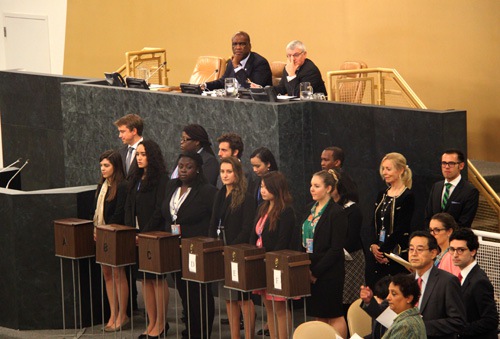|
 |
|
FIVE WINNERS: The UN General Assembly elects Chad, Chile, Lithuania, Nigeria and Saudi Arabia to a two-year term in the Security Council on October 17 (CNSPHOTO) |
The UN received an awkward and unprecedented birthday gift this year. Saudi Arabia turned down its rotating seat in the UN Council on October 18, citing disapproval of the Council's role in addressing Middle East issues.
A day earlier, the UN General Assembly elected Chad, Chile, Lithuania, Nigeria and Saudi Arabia to a two-year term in the Security Council.
Saudi Arabia clearly expressed its dissatisfaction about the Middle East situation, but its overreaction will not help to benefit either the regional issue, or itself, say Chinese observers.
Saudi dissatisfaction
"The UN became Saudi Arabia's punching bag on Middle East issues," Chen Xulong, a researcher on UN studies with the China Institute of International Studies (CIIS), said to Beijing Review.
According to a statement released by the Saudi Ministry of Foreign Affairs on October 18, the kingdom apologizes for not accepting the two-year term on the UN Security Council until the Council is reformed and enabled, effectively and practically, to carry out its duties and responsibilities in maintaining international peace and security. It also criticizes the UN Security Council for failing to address the Syrian crisis and the Palestinian issue, as well as neglecting to make the Middle East region free of weapons of mass destruction.
Western countries, such as the United States and France, claimed an "understanding" of Riyadh's decision to turn down the UN seat. But some Arab countries called on Saudi Arabia to rethink its choice.
Chen believes Saudi Arabia's behavior intended to express disappointment with the UN Security Council's handling of the Middle East issues. "To Saudi Arabia, the UN Security Council's resolutions on Middle East issues are far from reaching its own target," he noted.
But more importantly, according to Chen, Riyadh is releasing its discontentment toward its U.S. ally. Saudi Arabia has also been agitated about restless regional fighting as well as big powers' intervening in regional affairs, Chen said.
The United States has been the dominant power in Middle East issues. Since President Barack Obama took office in 2008, the United States has been adjusting its Middle East policies, trying to ease the tension between Washington and several regional powers. The Syrian crisis has been underway for over two years, but neither the UN Security Council nor the United States took effective measures against the Syrian administration, according to Saudi Arabia. The issue of Syrian weapons of mass destruction is still on the UN platform, in spite of Obama's anticlimactic threat of war against Damascus.
Yin Gang, an expert on Middle East studies with the Chinese Academy of Social Sciences, said that Saudi Arabia had made great efforts to obtain the UN Security Council seat for the past two years but they became meaningless following the rejection.
Yin noted that Saudi Arabia has been wishing to bring down President Bashar al-Assad of Syria. To Saudi leaders, a political solution of the crisis over the alleged use of chemical weapons in Syria in August actually exempted Assad from the fate of being overthrown, Yin said.
In addition, with the election of Iran's new President Hassan Rouhani, confrontation between Washington and Tehran is somewhat lessened, further upsetting Saudi Arabia.
Li Shaoxian, a senior research fellow with the China Institutes of Contemporary International Relations (CICIR), explained that Washington's easing of relations with Tehran seemed like an "overtopping diplomacy" to Saudi Arabia.
| 